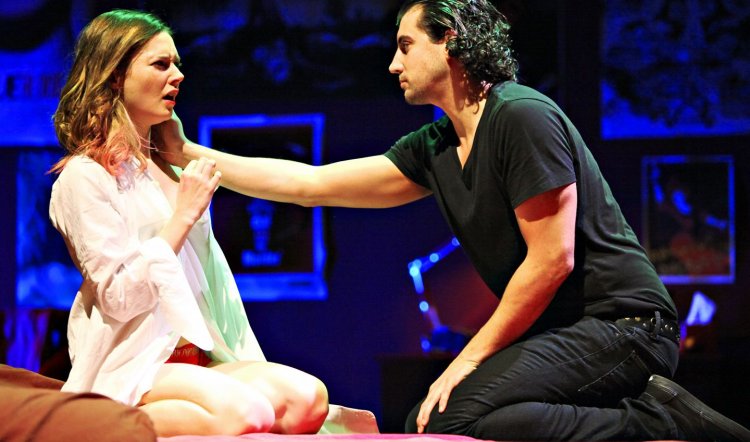
SYDNEY FESTIVAL - 'TIS PITY SHE'S A WHORE
'TIS PITY SHE'S A WHORE, Cheek by Jowl at the Sydney Theatre, 17-21 January 2012. Photos: Prudence Upton; Lydia Wilson and Jack Gordon.
WRITTEN by John Ford in 1633, directed by Declan Donnellan and designed by Nick Ormerod for Cheek by Jowl as a touring production in late 2011, ‘Tis Pity She’s a Whore arrived in Sydney direct from a packed house, hot ticket December in Paris. With the Cheek by Jowl imprimatur, it was always going to be one of the Festival's headline shows for 2012 and it signals to homegrown theatre-makers that Jacobean drama is in one of its periodic upswings on the fashion pendulum.
Marion Potts anticipated the trend at Melbourne's Malthouse with her own 2012 production of this play. It received the classic "mixed reviews" including a well-worth-reading one from Alison Croggon in Theatrenotes (theatrenotes.blogspot.com). Alison begins her thoughtful piece by suggesting that there's a good reason for the continuing interest in Jacobean tragedies. She wrote: "Aside from their unapologetic theatricality, which generates its realism from extreme emotional truths, their dark machineries reflected a godless world in which human passion flamed out and extinguished itself in a materialistic, cynical and bloodily hierarchical society. Morality in this universe walks uneasily …
"Women - their role, their power, their destruction in the crushing sexual morals of their time - are at the centre of these tragedies, and 'Tis Pity She's a Whore is no exception. When the Jacobean tragedies were written, political and public life was dominated by men. There were, however, notable exceptions, just as there are now: women such as Elizabeth I and Lucrezia Borgia subverted the expectations and limitations of the social roles expected of their sex, and the conflicts raised by their presences are reflected in the plays."
True-ish, but I'm not convinced that Ford's still-most controversial work (incest, ugh) actually does the above, but rather, sets off a knowledgeable and imaginative mind on a line of inquiry and exploration all of its own. And as Donnellan's slickly staged, smartly choreographed, well acted and judiciously pruned (just under two hours, no interval) production rattled along, I found myself wondering why? As in – why do it?
That was a reminder that in 2006 I wrote, of the STC's production of The Bourgeois Gentleman: "In the late 1980s, Richard Wherrett, then artistic director of the STC, programmed a handful of hitherto forgotten Jacobean plays under the heading "Neglected Classics". About 15 minutes into the first half of each it became clear why they had been forgotten and that they were justifiably neglected."
In this instance, 'Tis Pity has a bit more going for it than those re-forgotten epics, but not a lot. Cheek by Jowl puts it in a contemporary setting with the teenage heroine Annabella (Lydia Wilson) sitting on her bed grooving along to her headphones while mucking about on her laptop. That she's an attractive but somewhat confused girl is suggested by the odd collection of posters on the wall: Breakfast at Tiffany's, Gone With The Wind, The Vampires and True Blood. When she's joined by the company for a dance designed to introduce a variety of suitors as well as the potential of the young bride, the CD she slips into the player is an equally weird dancercise-style tune.

Annabella, however, has already succumbed to her brother Giovanni (Jack Gordon). Unfortunately, he looks unnervingly like Rolando Villazon and is therefore marked as a loser before he's even slipped it to his sibling. The illicit relationship is aided and abetted by Annabella's maid Putana (Lizzie Hopley), whose name being so close to the Spanish slang for whore signals that her own comeuppance will be bloody and ugly. Although in common with many sophisticated productions these days, the blood and gore quotient is not high (unless you have a really vivid imagination) as it happens almost offstage in an only partially visible bathroom.
Poisoning is always a trickier suicide or murder choice in centuries-old drama because few of us know what happens or how to act poisoned and most choices end up being unintentionally funny or plain silly. Hippolita (Suzanne Burden) solves the problem by going for the elegant, minimal option. Aside from seeming plausible, it's also in keeping with her position as the spurned lover of Soranzo (Jack Hawkins) Annabella's successful suitor. Also unpleasantly plausible is nasty sidekick Vasques (Laurence Spellman) a man whose willingness to do anything for a result is as contemporary as Sussex Street.
Another neat contemporary cultural reference is the casting of Nyasha Hatendi as the fire-and-brimstone Friar Bonaventura. His impeccable "Afri-English" is a charming yet ominous reminder that the Catholic Church is now dominated by African clerics - some of the most misogynist, homophobic and bigoted on the planet. The friar is the central character in the grim reality of womanhood in the England of the mid-1600s. At either end of the social scale, the female is a chattel and instantly disposable. Although incest is the trigger, this play's central motif is the linked pastimes of revenge and honour killing: both as acceptable then as they are in some cultures today. Plus ca change - only somewhat.
Nevertheless, despite the (very good) best efforts of the company, the play - for me - is underwhelming and a waste of time, energy and talent. Although neatly trimmed from what could be some three-plus hours of mayhem and melodrama, it seemed longer. That's possibly because of the atmospheric low lighting which meant I couldn't see my wrist watch – always traumatic. In retrospect, although one might think that with such ingredients as incest, murder, politics, ambition, lust, love and hate in the mix it would be a thrill a minute, it just isn't. For much of the time there is a great deal of yap yet very little happens. John Ford wasn't Shakespeare and it's obvious yet again why the latter is constantly performed and the former, thank god, is not.



